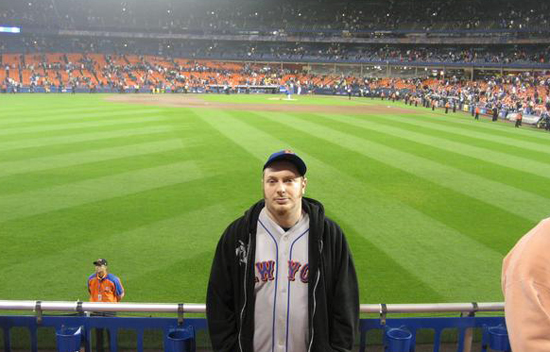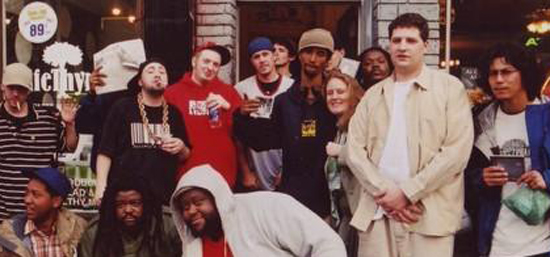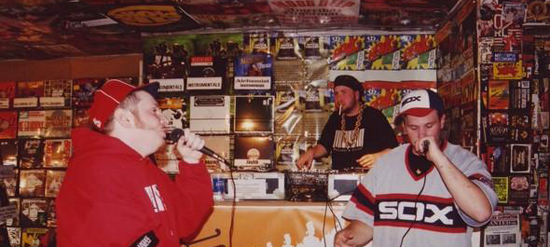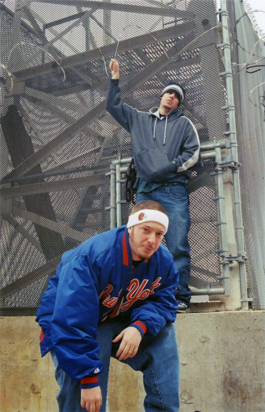An Interview with Nasa from Uncommon Records
Posted by Justin Boland on Jun 27, 2009 | 0 Comments

What are the most important legal milestones for someone looking to start their own label in 2009? What bases need to get covered ASAP?
Nasa: The first thing you need to do is craft a contract for the artists you will be working with. The contract needs represent the way you want to conduct business as a company and as a person. I would suggest crafting a short, concise document. Our contracts at Uncommon are only 2 pages long for example. I had the advantage of signing a contract back in the days, so I was able to look at that contract and use it as a template for mine. I got rid of what I didn’t like, and added what I wanted in there, but it taught me the flow and verbage of how contracts should read.
I would also suggest not writing a document that is an imitation of what you think a contract should read like. That’s amateurish. If you don’t know, do the research, don’t “play label”. Keep it simple, don’t go overboard.
Our contracts are very simple. We sign projects, not artists. An artist signs over the particular album that we are releasing for a certain amount of time, they don’t “owe us” x amount of records and our contracts are not exclusive. We allow artists to put out other records by themselves or with other labels, only the Uncommon record has exclusivity. A lot of times that exclusivity is only in the digital realm too, so they can press CDs and sell as they like. All profit, post-recoupment, is split 50/50. I don’t think we can be much more fair then that.
I started this label to help artists, not hinder them. That’s my business model and it’s represented in our contracts, every label should start there when creating their foundation of how they will be going forward.
What’s the most unexpected lesson you’ve learned from running your own operation with Uncommon Records?
Nasa: That’s a tough one, because there have been so many lessons it’s hard to determine which one was the most unexpected. I guess it’s getting over the fact that your music being dope really has no effect whatsoever on how successful you are. I always knew that making a successful label and career took a blend of talent, luck, money and contacts-but I had no idea that talent ranks a very distant 4th in that equation.

Do you have a template for planning future releases, or does each project come with unique demands and opportunities?
Nasa: I think over time you try to get a template of how you want to do things exactly with releases but that’s not always the easiest thing to do, or the smartest.
Addressing the “easiest” part first, when your a label like Uncommon, it’s basically a one man operation. I have some heads that help me out, but really it’s me at the controls for almost everything. That goes for planning releases, A & R-ing releases, booking shows, doing press and radio promotion, recording and producing music, managing the website and managing all the online promotion (ie. Youtube, Myspace, Twitter, blogs, etc). That sort of arrangement creates peaks and valleys based on time demands. So I can’t easily sit and say, “OK, we’re gonna put out an album every 3 months”. I’d like to sit down and do that, but it’s not feasible all the time. As this company grows I hope to add people to the staff starting as interns (hint, hint-send resumes!).
As far as it being the “smartest” thing to have a template for putting out records? That’s not always the best thing. Each project may appeal to a slightly different audience and each artist is an individual with unique expectations and goals. You have to treat records like babies, they breath and have a life of their own. Sometimes the level of “success” or coverage something gets is completely out of your control.
The second part of that nowadays is that as an artist you have to be putting the work in now for yourself and not depend on a label to every last thing for you. It’s a team effort or a collaborative effort. Artist coming to Uncommon, I think understand, that they have a record that they want to get out to as many people as they can. Thus, they want to do shows, promote on the internet on the various forms of social media, they might have their own blog or merch store. Artists really need to build their own “empires,” then bring that to a label like Uncommon which bolster that empire further. We’ve got our own kingdom here with a base of people that support us. We add credibility to artists no matter how established they may be or not be. The hope is that someone says “Wow, Artist X is doing something on Uncommon” and their just as excited about the artist being on our label as they are that our label is doing something with that artist because they are familiar with us both. It’s power in numbers, if you don’t get that that’s the way it works in 2009, I think your lost.
All of that feeds into why labels have gotten a lot looser with their “template” for releases. I think publicists (thank God) also have a lot less input on release schedules nowadays too because they carry less weight with the print media and terrestrial radio industries fading as they are.
You’re running a successful and growing operation on youtube-how do you keep that organized? What makes for good video content, in your opinion?
Nasa: Thanks, I think You Tube should be part of any indie label’s promotional effort. These days video is crucial to keep people’s eyes on you when they are online. It’s also very easy to flood You Tube on a budget.
I would suggest anyone reading this get a Flip Mino video recorder. It’s only about a 100 dollar investment and is the best way to record live performances to post online on a budget. It is a handheld (size of a cell phone) camera. It has one big red button on it that records, it’s idiot proof. Aim it at the stage and there you have a video that can sit online promoting you for all times. It “flips” out a USB port that you plug into any computer and it can post video with one click to Youtube or Myspace Video straight from the interface it comes with. Not everyone is going to be able to come and see you in your town live. Fans that aren’t living near you can really get a kick out of videos of you rocking, this is a global game now. Besides, people near you that can come see you may get more motivated to come the next time if they see what they missed the last time. Even if it’s low quality, who cares? It’s something.
I also found this website called One True Media. They have video editing tools that you can use from their website, so you don’t have to own an expensive video editing program. It’s like $3.99 a month to use their more premium tools and you can post straight to Youtube from the site. I’ve done “video flyers” for some of our big shows on there and promotions for upcoming releases. You can mix in slide show pics as well and add music beds. It’s really simple, it’s grimey, but that’s not really a bad thing for us.
Those are 2 incredibly cheap ways to get your You Tube operation popping and that is really huge. We’re about to launch a brand new website at uncommonmusic.net and we’re featuring a Livestream player as a main feature of it. Livestream is the next level of video integration, it lets you make playlists out of your uploaded or favorite videos on You Tube, it also lets you load video straight to it’s site or broadcast live from your webcam. There’s also a chat room in the widget where people can comment on videos. It’s pretty sick. It’s also free, because they run banner ads at the bottom of your videos, much like You Tube now does. The interface they have is like running a real TV Station, a must try and must see.
Video is huge online, you can’t have a site without video integration of some sort anymore. We went from having a few random videos to having a giant You Tube page and now a dynamic video player on the new site in a couple of months, with almost no money and I know it’s made a difference in hits back to the website and awareness of what we do generally online.

One of the most frequent questions I get these days is about being a recording engineer. How did you get prepared for that career? Also…was it an enjoyable job?
Nasa: It’s funny you ask that, it’s actually something I’d like to get back in to as my day job. When I got to a point in High School where I was forced to “choose a career path” this is what I chose. I loved music, had a whopping 66 Average and my folks had next to no money for any college. I went to a school called the Institute of Audio Research in Manhattan. Those were some of the most fun years in my life. It was around that time that the underground scene was really taking root, circa 1997 and I had just met the woman that would be my wife.
When I graduated school, I started interning in what I would now define as a “demo studio”, we charged people about 15 bucks an hour and advertised in the Village Voice in the classifieds. That’s how it was done back then. There was a lot of opportunity for jobs, especially PT. The studio scene in New York has changed a lot since then, with the advent of home recording.
I ended up at Ozone Music where I met all my favorite underground emcees of that era from when I was in school and started to build up my credits-when Ozone shut it’s doors I was picked to run Definitive Jux’s fledgling studio. At a certain point, Jux no longer needed a full time studio and I was let go. At that point, I went back to school for broadcasting, which is fine, but just not the same. I’m working (luckily) in that field now, but I want to get back into working with musicians again full time and am about to start working at venues doing live sound, I have a studio that hopefully some work will start spilling into the more I get back out there (hint, hint).
That’s one story on how I ended up in Recording Engineering, got out & want back in. Hopefully, that helps anyone about to chose that career. Schooling of some sort, I think is vital. You need to know electronics and the acoustics of sound to really do this right. If you don’t know what the numbers mean on your eqs and compressors and what they actually do, your not really mixing, your just thumbing around. With Recording Engineering there is a lot you have to be
taught and basically forget in order to fully understand something else that you use every day.
Does it make sense for small labels to pay for Soundscan numbers? Do you think that’s a necessary step?
Nasa: No, absolutely not. I think it costs several hundred dollars for that access, who really gives a damn? If you’re a small label, the CDs are in your crib, you can see what your doing. They’re either there or they’re not, you know? As a small label, your number one concern should be “am I making a quality product?” That goes to the music itself, the mix down of it, the packaging and artwork, the hype you can build for it. If you press a CD and are tracking Soundscan everyday waiting to see the numbers jump- I don’t know what to tell you. Soundscan in this environment has been replaced by your Web Site hits, those numbers mean more to you then anything else really as far as sales.
I know you’re not exactly a fan of Napster or Rhapsody: what’s your take on the digital distribution landscape in 2009?
 Paul Loverro: I’ve tried to push our fans toward services like Itunes, Emusic and Amazon because the pay scale is far better for artists and labels. Here’s the problem with Napster and Rhapsody and even a store like the Zune Marketplace:
Paul Loverro: I’ve tried to push our fans toward services like Itunes, Emusic and Amazon because the pay scale is far better for artists and labels. Here’s the problem with Napster and Rhapsody and even a store like the Zune Marketplace:
Payment first-they essentially charge the listener a fee per month to have access to pretty much their entire library. The listener “streams” songs from the company. The company then only pays you per stream or listen. That’s like 3 cents a listen. I think we see the problem here. It’s almost pointless. If all music was distributed this way, I don’t think there would be any music being released independently. Companies like Rhapsody walk away with 10 bucks a month or whatever they charge and give the artist next to nothing. In the meantime, the customer doesn’t even really have your track, at least in a more tangible form. They listen to more and attach to less.
Culturally-you can see where I’m going with this. What services like this say is “people that steal music through illegal means need to be satisfied in a way they can understand, they need to be brought into a payment fold that they can handle”. It’s almost like music outsourcing. The illegal downloaders driving down the price to the point where it almost makes no sense to charge people for your music. Fuck that. I work hard, we all work hard, we deserve something for our work. If we choose to drop something free to support our fans and spread the word, that’s on us-not you motherfuckers out there. And that extends to Rhapsody and Napster all these sorts of “pay for share” services.
The whole thing just cheapens the worth of a song for another generation.
I feel like nowadays there are a lot of powerful blogs, magazines and music think tanks that are run by people that grew up on the original illegal Napster. They saw the illegal Napster and the ensuing court cases as a struggle for “Freedom” or something. They want to sit at a round table and decide how those “musicians” can make money in some new way so that they can continue to get an ocean’s worth of music for a pittance. Fuck that. Online folks need to stop saying things like “well, musicians just need to tour more and make money on merch”. These are people that haven’t even been to shows lately themselves and probably haven’t played a note in their lives. Musicians must tour (or do shows locally or reginonally). That’s part of the art and how you spread the word and collect fans. This is a basic, but to say that’s the ONLY way that we should be getting paid is lunacy. Would they do that? I think not.
The same people rally hard about how much they want the majors to fall. To me it sounds like they are so busy trying to cause the majors to fail that they don’t realize they are in the process of setting up an all-new uneven and unbalanced system for artists.
Ahh, I can go on all day on this man. Got into a tangent, hope I answered your original question (laughs).
One last question: Who’s doing it right these days? What labels, managers, and artists do you think young, hungry cats should be studying up on and learning from?
Nasa: That’s the golden question. On one hand it’s unanswerable. No one knows, the business in total flux. The death of the CD can not come fast enough in my opinion and until that happens we will all be running in different directions trying to make something happen. The media is in flux too, the old print media is on the way out and also dying a slow death. At the same time, as we just talked about, we don’t have a perfect system for selling music set up online and if you’ve surfed the net and read blogs/social media you know that’s not the end result of what online media will look like either. I also refuse to count anyone in this conversation that has a big budget publicity company behind them or stacks of dough of their own.

With that said, I won’t leave you hanging. The game I respect right now is that of Homeboy Sandman. This dude does shows all the time NYC, he rocked “Yule Prog” for Uncommon in 2008. His sets are original, his music is really like nothing else that’s going on. He’s got a track called “Lighning Bolt” which is both progressive and hilarious at the same time which is really hard to pull off. His sets feature him rapping over just the crowd clapping and him dropping verses over intros to Muse songs. The guys got talent, but to go with that, he promotes online all the time-he has mad videos on Youtube made on a budget, and seems to be good at pollying with other cats that get behind his music and do some promotion for him. I give him the title of “doing it right” right now.
The Presence - Hermit Kingdom
Finally, here’s an example of making low-budget work in a high-concept way: the latest video from Uncommon artists The Presence, detailing the situation in North Korea. Hip hop as Edutainment is in the DNA thanks to acts like Poor Righteous Teachers and of course KRS One-here’s how it looks in 09:

